3 Jul 2024
Updated on January 31st, 2025
How AI is going to transform Fintech in Canada
Matthew Connor
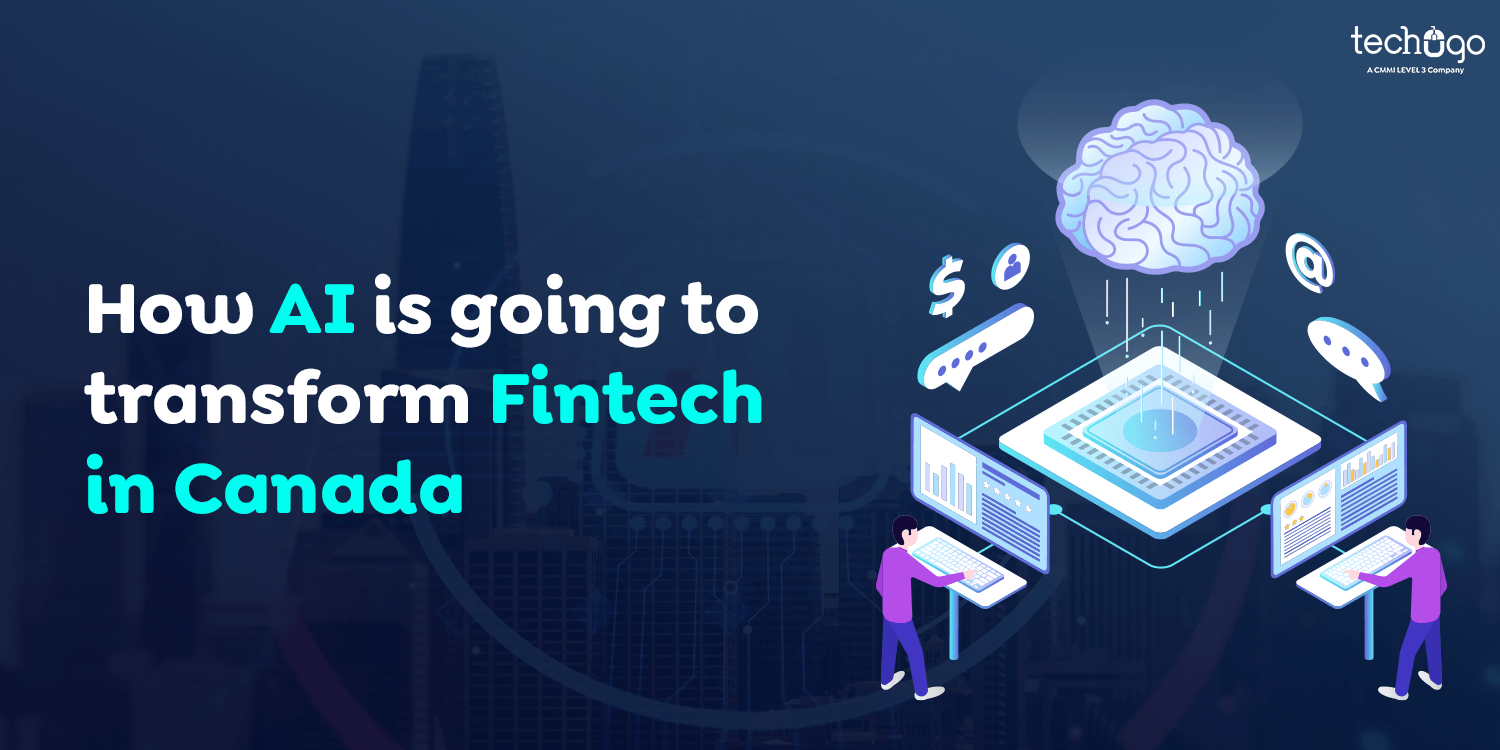
Are you ready for the AI revolution in the fintech industry? Artificial Intelligence (AI) is no longer a concept of the future; it’s actively reshaping industries across the globe today. Financial services, including fintechs, banks, and other related financial players, are leading this transition. AI in fintech remains important for organizations to understand or prepare for the overall transformation that AI is going to bring to the financial services industry. Due to this reason, artificial intelligence in the fintech market is anticipated to rise from $44.08 billion in 2024 to $50.87 billion by 2029, with a CAGR of 2.91%.
Do you want to be part of this growth? In this article, we’ll analyse how AI revolutionises the financial sector, the benefits you can expect, and many more.
What is the Significance of AI in Fintech?
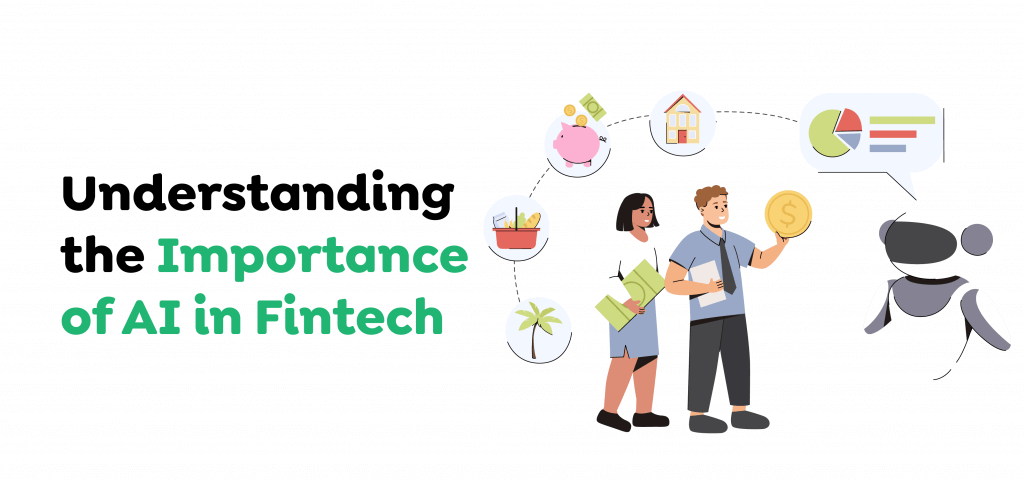
Artificial intelligence and Fintech amalgamation have revolutionized the financial services industry. Thus, the utilization of such systems in Fintech companies raises the bar for customer expectations and introduces an efficient, agile, and easily accessible approach to financial management.
AI is a crucial segment of fintech, using machine learning, natural language processing, predictive analytics, and cognitive computing. These technologies permit customers’ information to be gathered and analyzed for data-driven goals to improve compliance and customer satisfaction. In simple words, from management to complex algorithmic techniques used in credit scoring, Artificial Intelligence is now rapidly on the way to becoming central to most modern fintech firms.
Impact of AI in Fintech
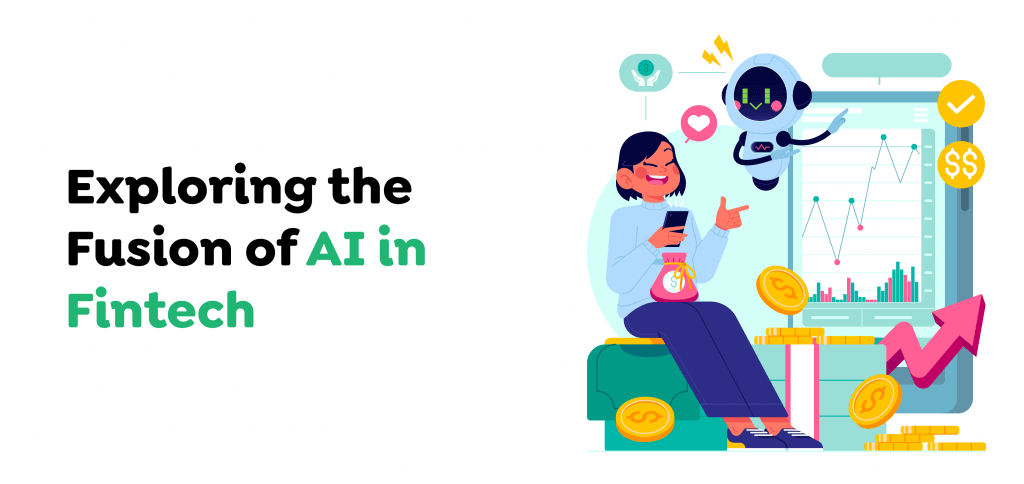
AI is the wave of the future prominent in fintech, where automation and personalization are taking unprecedented pushes. Here’s how AI applications in fintech are revolutionizing financial services:
Automating Financial Operations
AI is used to optimize critical financial processes to enable efficient cost-cutting across various industries. Key automation areas include:
- Data Management: It automates data input operations using NLP techniques that sort and analyze textual data from documents, emails, and forms.
- Credit Assessment: Machine learning concepts are used to sort large databases by credit scores, thus increasing the efficiency of the assessment of risks related to credit history and income.
- Fraud Detection: An AI app developed for fraud detection uses real-time transaction monitoring to identify inherent fraud and other disparities, posing an improved rearrangement defector for persisting innovative fraud schemes and decreasing false positives.
- Customer Support: AI customer support through AI-integrated chatbots and virtual assistants provides prompt customer support to answer questions and solve problems using NLP.
- Compliance: AI can simplify some regulations by performing tasks such as reporting and risk analysis, where it analyzes potential risks.
Personalizing Customer Interactions
AI in fintech incorporated by a fintech app development company empowers firms to deliver personalized banking experiences, boosting engagement and customer satisfaction:
- Personalized Recommendations: This kind of recommendation system in the financial industry features specific products and services using artificial intelligence according to user preferences.
- Customized Communication: AI-enabled chatbots, virtual assistants, and IVR systems deliver seamless interchanges across digital and voice platforms, supplying instant support and transaction help.
- Behavioural Insights: Predictive analytics powered by AI predict customer needs and life events, allowing proactive service offerings while preserving transparency and respecting privacy preferences.
- Automated Financial Planning: AI platforms suggest optimized investment portfolios and savings methods aligned with customer objectives, improving financial planning outcomes.
- Targeted Marketing: AI algorithms determine customer segments and preferences, facilitating targeted marketing campaigns that effectively drive cross-selling and upselling opportunities.
Innovating Financial Services
AI fosters innovation in fintech, unlocking new possibilities for financial products and services:
- Transaction Analysis: AI analyzes transaction data to categorize expenses and provide detailed insights into spending patterns, empowering users with better financial management tools.
- Conversational AI: NLP-powered conversational interfaces improve accessibility to financial services via intuitive interactions appropriate for customers of all technical proficiencies.
- Biometric Authentication: AI-driven biometric verification techniques such as facial recognition and voice authentication enhance security and user experience by diminishing dependence on traditional authentication methods.
- NLP for Contract Management: AI-powered NLP tools simplify contract analysis processes, removing critical information from legal documents to expedite review and decision-making.
- Dynamic Pricing Strategies: Machine learning algorithms in fintech authorize real-time adjustment of product pricing established on market dynamics and customer behaviour, optimizing revenue generation.
These AI technologies can help the growing fintechs in Canada and elsewhere achieve operational excellence, enhance customer satisfaction, and boost innovation. Thus, AI in fintech helps firms position themselves in the constantly emerging category of digital financial services.
After learning about the different applications of AI in fintech that are transforming the industry, let’s delve into its various benefits.
Benefits of AI in Fintech
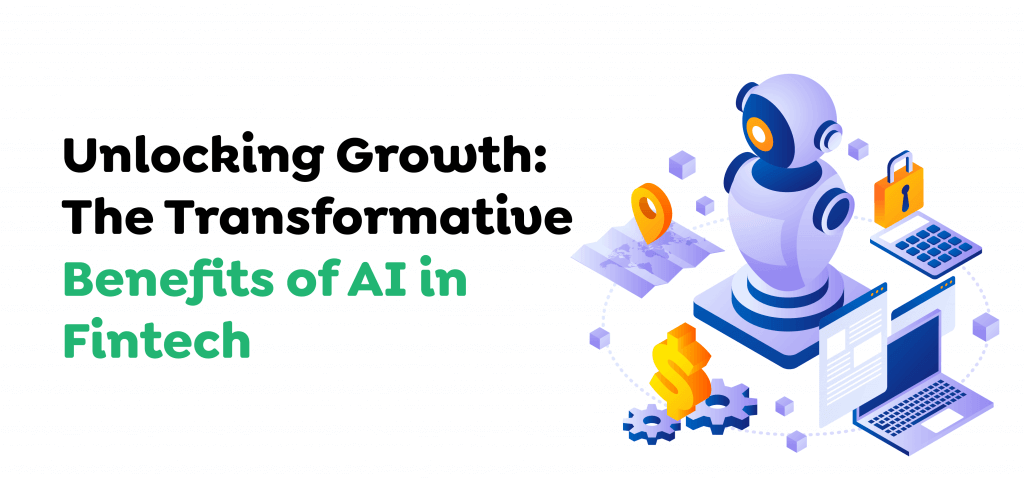
Financial enterprises are harnessing the benefits of AI in fintech to exercise significant impact across the landscape of financial solutions services. Here’s how AI can revolutionize business processes:
-
Personalized Financial Insights:
These intelligent insights can be driven using AI-based analytics, including historical data, spending profiles, and market data. This helps in the effective development of good working plans, ways of investing, and even working budgets with the customer’s best needs in mind. For example, banking applications employ AI to suggest individual financial investment options that align with the customer’s objectives and the possible level of risk they could handle.
-
Enhanced Risk Management and Fraud Prevention:
Risk management is improved through AI, where transactions and customer behaviours are observed for aberrations in real-time. This proactive approach ensures that any issues or financially hazardous situations are addressed and dealt with before they develop into a significant crisis. Machine learning solutions, in particular, are excellent at finding complex patterns and detecting potentially fraudulent activities.
-
Advanced Credit Assessment:
Credit management systems using artificial intelligence for credit risk analysis analyze credit capabilities based on different parameters, including income levels, employment history, and behavioural patterns. This helps financial institutions arrive at very quick and accurate decisions regarding the extension of credit to the borrowers, thus facilitating the flow of credit to the country’s populace. Also, AI combines options for non-traditional credit risk evaluation to consider the borrowers’ creditworthiness in greater detail.
-
Data-Driven Insights and Analytics:
Financial institutions use artificial intelligence to pull insights from huge datasets, which can be used to optimize processes and identify market possibilities. AI-driven analytics systems analyze financial data and market movements, allowing corporations to enhance customer satisfaction, develop well-tailored marketing strategies, and gain higher retention rates based on actionable insights.
-
Algorithmic Trading Advancements:
AI algorithms aid high-frequency traders by enabling them to perform trades at a very high pace and accurately while analyzing stock market data in real time. They are flexible to volatile markets by recognizing profitable trading options and effectively handling risks. In hedge funds and investment companies, artificial intelligence-powered predictive models forecast where the market is likely heading, thereby giving insights for informed decision-making.
-
Sentiment Analysis for Market Insight:
AI-derived sentiment analysis decodes market insights from news articles, social media channels, or analyst reports. This helps investors appreciate how the market views assets or industries, thus aiding in productive trade choices. Market professionals optimize investment strategies based on sentiment shifts and trends to gain a competitive edge.
-
Financial Forecasting using Artificial Intelligence:
AI algorithms employ records and macroeconomic indices to predict future market conditions. This usefulness in forecasting encourages strategic planning, risk avoidance, and financial allocation across all departments. Banks use AI to model credit risks, while finance analysts prefer them for accurate predictions of stock prices and economic indicators.
-
Integrating Blockchain for Efficiency:
Incorporating AI with blockchain technology assures financial transactions’ transparency, security, and operational efficiency. AI-enabled smart contracts automate contract enforcement and compliance monitoring, declining transaction costs compared to conventional methods and decreasing the associated risks. Such integration promotes a compliant environment that is needed to uphold openness and guarantee faithfulness throughout the finances.
Incorporating AI in fintech has enhanced innovation and competition in the financial services industry. Moreover, AI in fintech provides personalized, secure, and efficient solutions that consider changing market needs.
Moving forward, let’s discuss the challenges and their solutions encountered in integrating AI in fintech.
Challenges of Using AI in Fintech

Let’s discuss some challenges faced by firms in incorporating AI in fintech:
-
Regulatory Compliance in AI Integration:
Integrating AI into fintech operations requires strict compliance with regulatory standards like GDPR, PCI DSS, etc. It will also demand extensive legal expertise to ensure that AI systems are aligned with data privacy regulations and safety through robust risk assessment frameworks.
Solution: Conduct audits and create strategies for adhering to the provisions, which are only specific to Al integration. It is advisable to involve legal and regulatory professionals who are experts in this field. Implement transparent data handling practices and regularly update AI models to meet evolving regulatory requirements.
-
Explainability and Transparency of AI Algorithms:
The fundamental impenetrability of AI algorithms makes explaining the decision-making process difficult, especially when it comes to important areas like credit scoring or investment recommendations. A lack of transparency regarding artificial intelligence-powered financial services can cause user distrust and poor acceptance rates.
Solution: This should be done mainly by developing a more understandable Al that brings about clear insights regarding the decision-making processes. Improve transparency through interpretability techniques such as model documentation, feature importance analysis, interactive interfaces, etc. Increase stakeholders’ awareness of how Al works to foster trust.
-
Integration Complexity and Technical Hurdles
It is not uncommon for fintech ecosystems to have complicated IT structures and various data sources, making it difficult for AI technologies to integrate seamlessly. The problems faced include data compatibility, inter-system operability, and guaranteeing the working capacity of AI models in a production environment.
Solution: To make the integration process more effective, data scientists, software engineers, and AI professionals should be brought together. Various data sets on AIs should be tested for robustness and performance before being used. Cloud solutions and adequate infrastructure will assist in implementing agile deployment of AI capabilities.
-
High Costs of AI Implementation
Implementing AI in fintech involves substantial upfront investments in technology infrastructure, talent acquisition, and ongoing maintenance. Cost considerations must be balanced with expected benefits and long-term value creation.
Solution: Reduce AI implementation costs by engaging external vendors for specific skills and infrastructure. Evaluate third-party service providers with financial technology artificial intelligence (AI) expertise to reduce upfront costs without sacrificing scalable and efficient AI deployments. Phase in expanding the services using strategies based on expected ROIs and strategic priorities.
The fintech firms can transform merit by proactively addressing such challenges with strategic solutions that will drive innovation, efficiency in operations, and customer centricity across all stakeholders despite being diversified into various forms of financial services.
Let’s explore how AI can shape the future of security in the FinTech industry amidst escalating cyber threats and regulatory challenges.
Future of AI in Fintech for Enhanced Security
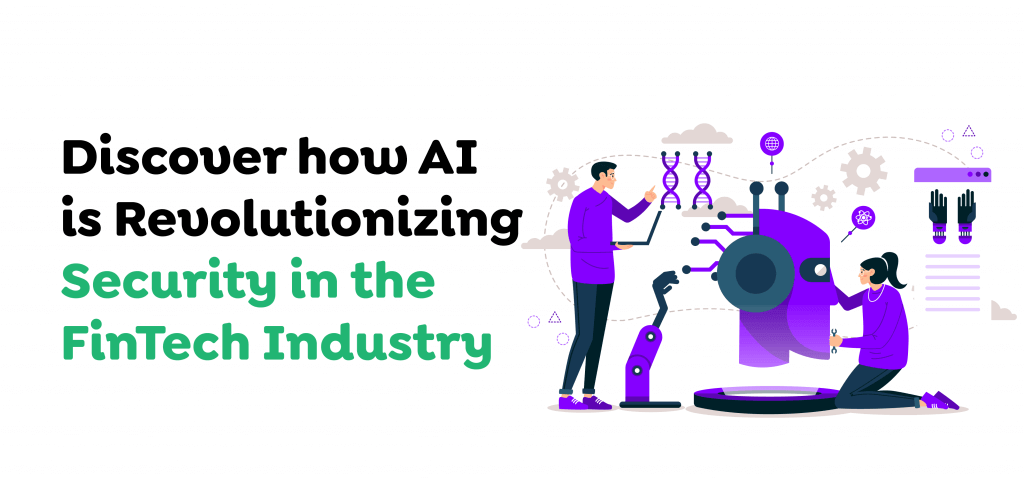
The future of the FinTech industry depends on using advanced technology to make operations efficient and protect against growing security risks. As financial institutions move through increasing minefields of risk, fraud, and regulatory compliance issues, artificial intelligence integration becomes a game-changer.
AI in fintech is changing how banks and credit unions ensure the safety of customer assets and data. Given the increased complexity of malware attacks in cyberspace, AI-driven developments definitely improve operational efficiency, customers’ experiences, and security measures.
The fast pace of AI’s evolution mirrors the growing intensity of cyber threats. Hence, for FinTechs targeting business expansion and better services through the use of AI, security must be a primary concern because emerging risks are already there. AI is not just an enhancer but a vital protective technology ensuring continuity and competitiveness across all finance houses globally.
It’s obvious from these advancements that worldwide financial firms celebrate artificial intelligence immensely with wonderment and expectation.
Let’s delve into how Techugo transforms your financial operations with cutting-edge AI solutions.
Why Opt for Techugo?
The fintech industry is being remodelled by the inclusion of AI, meaning that there are ways to make financial services more secure and efficient. To keep up with the changes in this market, an AI app development company like Techugo adopts futuristic AI technologies to meet dynamic customers’ needs.
Techugo’s speciality is AI app development, with customized solutions applicable to fintech, telecoms, health care, manufacturing, real estate, etc. Whether you need predictive analytics, personalized marketing tools, biometric data analysis, or AI-powered chatbots, among other latest technologies that will change your world, our team has you covered.
In A Nutshell!
Artificial intelligence (AI) is profoundly changing Canada’s fintech landscape, leading to a more efficient, creative, and customer-centered era. By utilizing AI in fintech, financial institutions can optimize their processes, promote risk management, and offer personalized services that respond to the requirements of individual clients. Comprising AI-powered tools like predictive analytics, chatbots, and algorithmic trading models permits immediate decision-making and strategic insights to maintain a competitive advantage in this rapidly changing market.
Moreover, AI in fintech can be considered a promising field. Relating to AI usage in the financial sector, AI is expected to help institutions reach new heights and unveil new levels of their performance, security and customer satisfaction. The use of AI thus not only places fintech companies a step ahead in an environment that is progressively being defined by the use of technology but also enables firms to transform and reinvent themselves constantly whenever the need arises. Financial service enterprises are getting ready for this exciting change with the aid of an AI app development company like Techugo, bringing out new potential solutions that can be customized to fit the demands of the future.
Get in touch with us today to begin a journey towards digital transformation and excellence together.
Get In touch
We are excited to here from you and let’s start something special Together. Call Us for any inquiry.
Write us
sales@techugo.caJust a call away
About you




